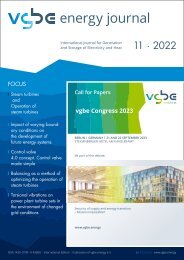VGB POWERTECH 10 (2019)
VGB PowerTech - International Journal for Generation and Storage of Electricity and Heat. Issue 10 (2019). Technical Journal of the VGB PowerTech Association. Energy is us! Cyber security. Power generation. Environment. Flexibility.
VGB PowerTech - International Journal for Generation and Storage of Electricity and Heat. Issue 10 (2019).
Technical Journal of the VGB PowerTech Association. Energy is us!
Cyber security. Power generation. Environment. Flexibility.
Erfolgreiche ePaper selbst erstellen
Machen Sie aus Ihren PDF Publikationen ein blätterbares Flipbook mit unserer einzigartigen Google optimierten e-Paper Software.
<strong>VGB</strong> PowerTech <strong>10</strong> l <strong>2019</strong><br />
<strong>VGB</strong>-Book<br />
Failures and Forced Unavailability of Power Plants<br />
Henk C. Wels<br />
<strong>VGB</strong>-B 035 | <strong>2019</strong><br />
DIN B5, 276 pages, price: 48.– €, + VAT and postage<br />
Failures and<br />
Forced Unavailability<br />
of Power Plants<br />
Henk C. Wels<br />
<strong>VGB</strong>-B 035<br />
Power plants are not functioning to the fullest <strong>10</strong>0 % of the time. Maintenance and inspection of some components<br />
require them to be off-line in time, however, this can be planned such that customers continue receiving power from<br />
the electrical grid, steam or district heating from other plants. Unplanned outages due to failures or external conditions<br />
may cause surprises and can lead to situations in which the demand is not satisfied at short term at large costs.<br />
When plants are similar in size or when feasible given the number of plants, the N-1 principle can be followed. The<br />
electrical grid operator has contracted a plant in hot standby or makes the plants in operation to set their power by<br />
an amount of spare sufficient to remedy loss of a plant and that can be controlled up or down to keep the frequency<br />
constant and the total demand being met. When a large number of plants are meeting the demand, a reserve factor<br />
>1 can be applied depending on economical boundary conditions and/or grid connections with abroad.<br />
When demand is not met, the grid operator has to lower this demand by curtailing load to make sure that generators<br />
protection systems do not switch off so many generators that due to a domino effect a blackout occurs with<br />
large parts of the grid without power. Therefore, forced unavailability results in additional installed power that takes<br />
time to realize and it is costly. Unavailability, planned or forced, results for the owner of the plant in fixed costs<br />
(capital, maintenance, personnel) that are not compensated by income from MWhrs produced if no margin would<br />
be added to income.<br />
Given this relevance, unavailability must be minimized, however, not at all costs. For reserve units that operate only<br />
a few hours per year it does not pay to repair around the clock resulting in minimum forced unavailability.<br />
The overall costs must be minimized at maximum production income within market and regulatory constraints.<br />
In this book unavailability is modeled both qualitatively and quantitatively. Without modeling, (describing how<br />
power plants seem to react on the factors that define unavailability) one cannot optimize. With modeling comes the<br />
ability to forecast unavailability as a factor of influence factors such as operation hours, starts, plant layout. Models<br />
for human decision making are not discussed, only the effects of this decision making are studied.<br />
The book is derived from earlier papers presented at ESREDA, PGMON, <strong>VGB</strong> Working Groups and other committees<br />
while working with KEMA and its legacy companies and departments NRG, DNV-GL and DEKRA. The consent of<br />
representatives of these organizations and firms for copying and further publishing has been granted. The names of<br />
power plants still operating have been omitted or made anonymous. A description of the work of ESREDA is given.<br />
<strong>VGB</strong> PowerTech Service GmbH Deilbachtal 173 | 45257 Essen | P.O. Box <strong>10</strong> 39 32 | Germany<br />
Verlag technisch-wissenschaftlicher Schriften | Fon: +49 201 8128-200 | Fax: +49 201 8128-302<br />
mark@vgb.org | www.vgb.org/shop<br />
Stay in contact with us! Newsletter subscription www.vgb.org/en/newsletter.html<br />
90


















